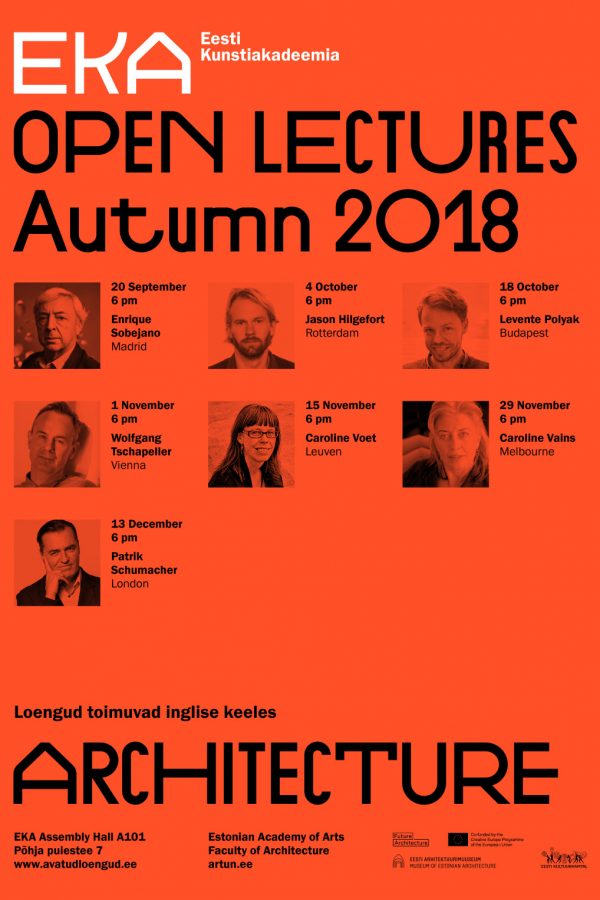
Department of Architecture and Urban Design of the Estonian Academy of Arts is happy to present the Open Lecture Series lineup for the autumn semester – a number of exciting architects, urban planners, academics from across the world. The lectures are free of charge, in English, take place every fortnight, and are open to everyone – for both students and professionals of the field, general audience and students considering architecture for their further studies.
Since EKA moved into its new building end of August, all the lectures will take place in the large hall of the new building. The lectures and will begin at 6 pm. This year, the co-curators of the lecture series have changed – alongside longtime curator Sille Pihlak, architect Johan Tali stepping up to the challenge.
Opening the season on 20 September at 6 pm will be the Spanish architect Enrique Sobejano. Sobejano is the founder and partner of Nieto Sobejano Arquitectos, that won the architecture competition of the new building of Arvo Pärt Centre to be opened in October. The Spanish architecture bureau received the prestigious Alvar Aalto Medal and became an honorary member of the American Institute of Architects in 2015. The Madinat al-Zahra Museum by Nieto Sobejano Arquitectos in Spain received the European Museum of the Year award in 2012 and the Contemporary Art Centre Córdoba was shortlisted for this year’s Mies van der Rohe Award. In his lecture, Enrique Sobejano will introduce the new building of Arvo Pärt Centre. He will describe what the intentions of the architects were and what kind of space they wanted to create.
On 4 October, the next speaker arrives in Tallinn – urbanist-architect Jason Hilgefort is the co-founder of Land+Civilization Compositions, a Randstad (Netherlands) and Istanbul based office that works and collaborates on issues related to built form, with a portfolio scope from research to design. Hilgefort’s work experience ranges from New York (Ehrenkrantz Eckstut and Kuhn), to Los Angeles (Behnisch Architekten) to Mumbai (Rahul Mehrotra). After joining Maxwan A+U in 2007, he was involved in the ongoing projects Moscow A101, Central District Rotterdam, and Barking Riverside in London.
On 18 October, the lecture series continues with Hungarian urban planner, researcher, community advocate and policy adviser Levente Polyak, who specializes on urban regeneration, cultural development, community participation, civic economy, social innovation and local resilience, focusing of movements like Lasnaidee or Telliskivi Neighbourhood Association in Tallinn.
In November, the series continues with the lecture of Vienna-based architect Wolfgang Tschapeller. Initially trained as a carpenter, he studied architecture at the University of Applied Arts in Vienna and at Cornell University. Since 2005, he has been a professor of architecture at the Academy of Fine Arts in Vienna and as of 2012 he is the head of the Institute of Art and Architecture. Known for his unusual building proposals, Tschapeller’s major projects include the BVA 1, 2, and 3 series for the Vienna headquarters of the Austrian Insurance Fund for Public Employees; the European Cultural Centre in Aachen, Germany; the project for the Centre for Promotion of Science in Belgrade and the University of Applied Arts Vienna.
Tschapeller is followed by Caroline Voet, co-founder of the award-winning architectural practice Voet en De Brabandere in Antwerp, Belgium. She focuses on reconversions and the design of cultural buildings, public interiors, scenography and furniture. Voet is professor at the KU Leuven, Faculty of Architecture. She holds degrees in architecture from the Architectural Association in London and the Henry van de Velde Institute in Antwerp. Her research and teaching focus is on spatial systematic and architectural methodology.
The penultimate speaker of the lecture series is Caroline Vains, an interdisciplinary practitioner working across spatial, social, installation, event, performance and urban intervention design. Vains is a lecturer at RMIT’s School of Architecture & Design, her research has focused on the city as a branded environment; the ‘city of shopping’; its mechanisms of display and seduction; the overlaps, conflicts and compromises between the public space and commercial interests; and access to the public commons (spatial, cultural and social).
To wrap up the Autumn lecture series, on 13th of December, is Patrik Schumacher the director of Zaha Hadid Architects. His completed projects include the MAXXI Centre of Contemporary Art and Architecture, Rome, which won the Stirling prize in 2010 and one of the practice’s first completed constructions, the Vitra Fire Station (1992). He is currently involved in several master plan projects, including Kartal Pendik in Istanbul and Singapore One North. In 2017, Zaha Hadid Architects’ proposal titled ‘Streamcity’ was selected as the winner of the international competition to masterplan the revitalization of the Old City Harbour in Tallinn.
Schedule
September 20th Enrique Sobejano
October 4th Jason Hilgefort
October 18th Levente Polyak
November 1st Wolfgang Tschapeller
November 15th Caroline Voet
November 29th Caroline Vains
December 13th Patrik Schumacher
The Architecture and Urban Design Department of the Estonian Academy of Arts has been curating the Open Lectures on Architecture series since 2012 – each year, a dozen architects, urbanists, both practicing as well as academics, introduce their work and field of research to the audience in Tallinn. All lectures are in English, free and open to all interested.
The series is funded by the Estonian Cultural Endowment. Jason Hilgefort’s and Levente Polyak’s lectures are part of the Future Architecture program which introduces and celebrates innovation, experimentation and the ideas of a generation that will design the architecture and build Europe’s cities in the years to come. See: http://futurearchitectureplatform.org.
Curators: Sille Pihlak, Johan Tali
www.avatudloengud.ee
https://www.facebook.com/EKAarhitektuur/
Additional information: Pille Epner, arhitektuur@artun.ee
